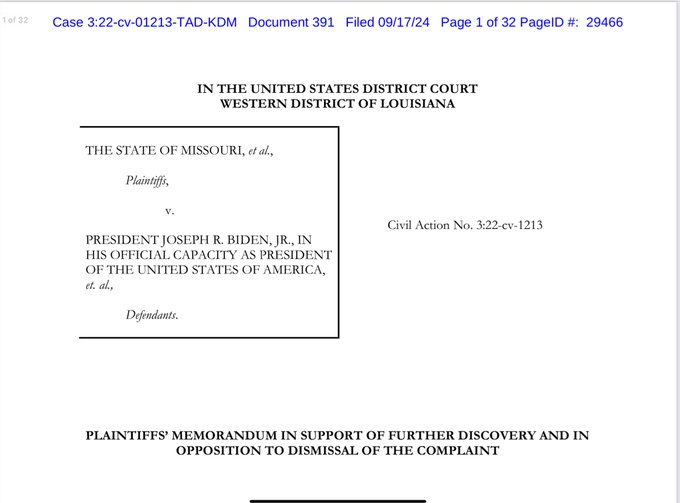
About three weeks ago, Judge Doughty asked the parties to brief him on:
1. Why he shouldn't dismiss the case given the SCOTUS decision—and
2. Whether or not the Plaintiffs needed more discovery to prove they could meet the (absurd) standing threshold the court set in place.
This will be a thread of the Plaintiff's response to the Judge's request. They started this lawsuit because of public comments made by officials in the Biden administration. When granted preliminary injunction-related discovery, they uncovered a coordinated censorship campaign—with some of the justices on the SCOTUS remarking this was the "most massive attack against free speech in United States history."

They make sure to point out that while both the district court and the 5th circuit court decided to uphold the injunction based on the *merits* of the case, the SCOTUS declined to do so and said so. They make sure to clarify that SCOTUS at no point did SCOTUS fail to allege standing adequate to maintain the lawsuit—ONLY for the INJUNCTION.

They point out that there is a significantly higher burden for standing at the preliminary injunction stage when it comes to proving all aspects of a claim—but argue that the court already ruled in their favor on the motion to dismiss. Hence, they are, in fact, entitled to more discovery.

After all, how are they supposed to prove their case *without* discovery? What is important here is that Missouri et al. argue that the SCOTUS decision wasn't on the case's merits but on the TEMPORARY INJUNCTION. That ruling doesn't negate the rest of what has happened in the case.
They are saying, "Judge, this step you are requesting is unnecessary. We already demonstrated there is a likelihood of succeeding on the merits of this case. Why go through this exercise in discovery again? Let's just move to normal discovery in the case and get this show on the road."

Not only that, but they are also asking for permission to amend their complaint to add the "disinformation dozen," one of whom is RFK—stating that the Judge should permit that as a standalone to remedy his potential worries, or BETTER YET, in addition to, as they absolutely meet the burden SCOTUS requires now.

They reiterate what some SCOTUS justices have said. If the court dismisses this case without allowing more discovery in the normal course or an amended complaint, it will reward the government for its censorship activities.
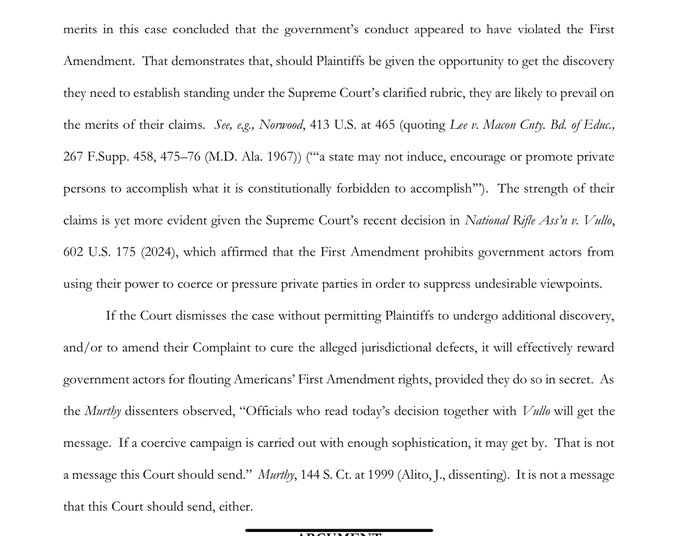
Here, they argue that the Supreme Court's ruling on standing ONLY concerned the injunction, where a standing requirement is much higher. I (and others) have stressed this since the day the Supreme Court ruled.

Additionally, the court has already denied the motion to dismiss. There isn't one currently on the docket. Thus, the Judge has already ruled that the case should continue, so why change that now, voluntarily? No circumstances in the case or fact pattern have changed, only the SCOTUS overturning the injunction.

Here, they mention that even since discovery, evidence has been uncovered that establishes what the government has done and is doing. They have refused to provide it for the court's consideration. If history is any guide, pulling at that onion will unleash even more, hence the need to continue.

The government lied about its censorship operations, and only when they were granted discovery did they uncover how vast it was—to the government's chagrin. They identified *at least* 100 officials involved.

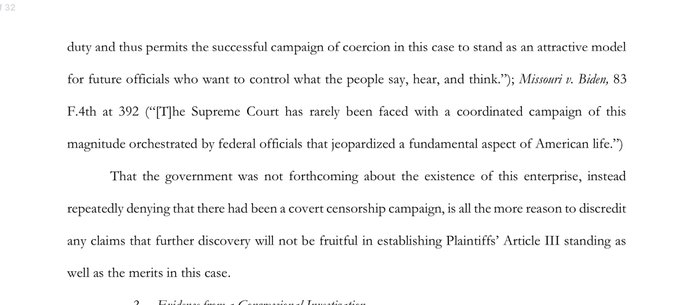
And, outside of the court-ordered discovery (which they withheld as well—check this article for details), the congressional investigations conducted yielded MANY results—not because the government handed things over, but because the social media companies were subpoenaed and complied.
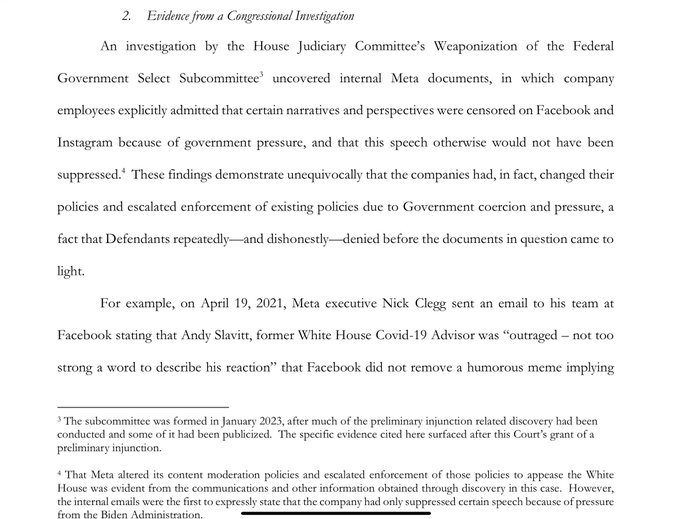
They also mention Mark Zuckerberg and the letter he penned, lamenting how he caved into government pressure to censor.

If this case and the congressional investigation hadn't happened, we would never have had proof of the censorship apparatus at play. The SCOTUS sought evidence that "a particular defendant pressured a particular platform to censor a particular topic." Hence, greater discovery is needed.

They cite specific examples of things that have come to light since filing suit—impacting two of the individual plaintiffs (and more.)
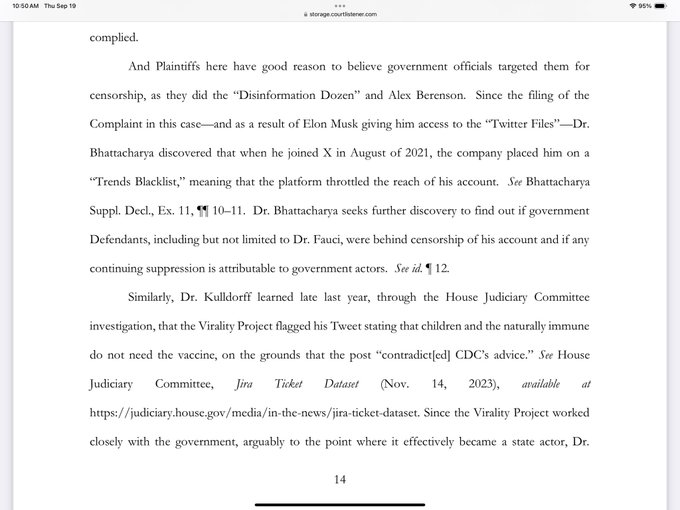
They also state they need to broaden their search to sources they didn't realize they needed to inquire about—given Fauci's DOCUMENTED evasion of FOIA.

They also point out that SCOTUS mentioned that plaintiff Hines had "one or two" potentially viable links that would grant her standing in the case, implying that if she had more, she would have demonstrated standing (stronger?). This being the case, they argue that more discovery can only help that process. They definitely won't find "less."
Further pages demonstrate that the Plaintiffs can prove future harm, as they had submitted declarations that they were being harmed. More discovery and deposition would allow for a fulsome record and establish the case.
I also love that they brought in Zullo, a case that SCOTUS ruled on before they ruled on M v. B. This ruling made me hopeful for this case at SCOTUS. The court rejected the same defenses the government made in this case, so I was stunned when this decision didn't go well.
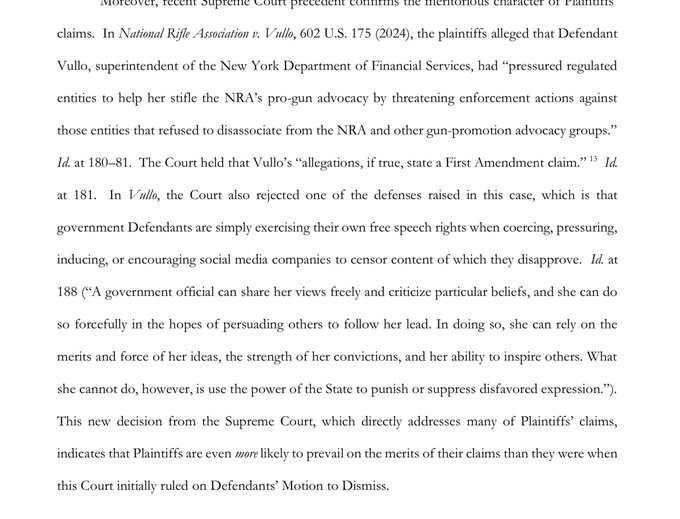
In conclusion:

MY THOUGHTS: This is a strong filing, and I think it is precisely what the Judge was looking for when he requested it. This way, both parties can brief, and when he decides to allow the case to continue (I believe he will, given past history), any higher court will have these briefings to go on as well. The fact remains: the SCOTUS DID NOT RULE on the standings of the case as a whole - ONLY the injunction. I will thread the Defendant's filing when it is released.


